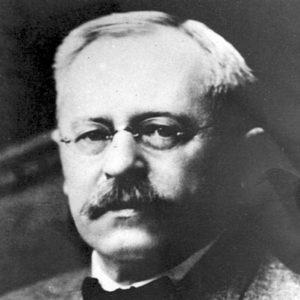calsfoundation@cals.org
Jacob Trieber (1853–1927)
Jacob Trieber of Helena (Phillips County) and Little Rock (Pulaski County) was the first Jew to serve as a federal judge in the United States. Serving from 1900 to 1927 as judge for the U.S. District Court, Eastern District of Arkansas, he became known in judicial circles as a “genius as lawyer and jurist.” He presided over more than 1,000 cases annually, kept his docket current, and had time to serve many assignments outside his own district. He issued nationally important rulings on controversies that included antitrust cases, railroad litigation, prohibition cases, and mail fraud; some of his rulings, such as those regarding civil rights and wildlife conservation, have implications today. His broad interpretation of the constitutional guarantees of the Thirteenth Amendment, originally overturned by the post-Reconstruction U.S. Supreme Court, was validated sixty-five years later in a landmark 1968 equal opportunity case.
Jacob Trieber was born in 1853 in Raschkow, Prussia, to Morris Trieber and Blume Brodeck Trieber. He attended school at Ostrow (near Raschkow and Breslau—present-day Wroclaw, Poland) through the elementary level. In 1866, he moved with his family to St. Louis, Missouri, and continued his schooling. Two years later, the family moved to Helena and opened a store, where Jacob clerked. In 1873, he began studying law in the evenings under former Arkansas Supreme Court Justice Marshall L. Stephenson. He was admitted to the state bar in 1876 and formed a partnership with Stephenson’s brother, L. C. Stephenson, and later with Marshall.
As his adopted home, Arkansas became dear to him, although the blatant racism he saw had a lifelong effect on his life and work. He “sought to communicate—through his own life and deeds and his commitment to equal justice—that racism was detrimental to the people of Arkansas” and that only until the state’s race relations problem was solved could the “state’s great potential be achieved.” He attacked Arkansas’s election laws, saying they disenfranchised black voters. “Certain rights are inherent in every free man,” he said. He saw this as true not only for African Americans but for women, and he spoke out for women’s suffrage. “A woman is a person and should be entitled to all the rights guaranteed by the constitution to a male person.” In a 1914 speech, he predicted that within ten years women in every state would have the right to vote.
Trieber’s interest in civil rights stemmed from what he had seen in Europe as a youth. He later recalled his childhood days in Prussia, remembering how the discrimination against Jews consumed the country. He said he “feared any country’s future that would allow such discrimination against its citizens,” and he hoped Arkansas could steer a different course.
He became a member of the Republican Party in 1874, believing its policies of that day—a strong union, primacy of the U.S. Constitution, pro-business policies, greater opportunities for African Americans, and a high protective tariff—were best for the nation. He was elected to Helena’s city council in 1882, named superintendent of the state census in 1890, and elected Phillips County treasurer in 1892. In 1897, he was appointed U.S. attorney for the Eastern District of Arkansas and moved to Little Rock. In 1900, President William McKinley appointed him federal judge for the Eastern District of Arkansas.
Trieber’s civic legacy in Arkansas was far-reaching. He was at the forefront of varying campaigns, such as saving the Old State House from destruction, establishing the Arkansas State Tuberculosis Sanatorium in 1909, and, during World War I, serving on the Arkansas State Council of Defense and representing the state on the American Red Cross national board. He supported laws regulating alcoholic beverage traffic. In his years as a lawyer and judge, he drafted many laws that were written into the state’s statute books, including the Banking Law in 1913.
Trieber married Ida Schradski of Peoria, Illinois, January 10, 1882. They had two children, Harry and Bess. The family was affiliated with Congregation Beth El of Helena and, later, Congregation B’nai Israel of Little Rock—both Jewish Reform. A Mason for more than fifty years, he was elected Grand Master of the state’s Grand Lodge in 1906 and served two years.
Because Arkansas’s judicial system seemed unable to prevent violence and racism, Trieber used his rulings against such injustices. Two of his rulings in 1903 involved the whitecappers (groups similar to the Ku Klux Klan). United States v. Hodges dealt with fifteen whitecappers’s efforts to have black workers fired at a sawmill in Poinsett County. United States v. Morris was a case involving terrorism by whitecappers in Cross County. In Hodges, Trieber instructed jurors to consider whether a person should be permitted to employ whom he pleased or whether others could compel him. In Morris, he held that “the rights to lease lands and to accept employment for hire are fundamental rights, inherent in every free citizen,” regardless of race or color. Three of the fifteen defendants convicted in Hodges—Reuben Hodges, William R. Clampet, and Wash McKinney—appealed Trieber’s ruling (Hodges v. U.S.). In 1906, the U.S. Supreme Court overruled Hodges, reasoning that the ability to earn a living was not a fundamental right of citizens protected by the Thirteenth Amendment.
The Supreme Court’s decision on Hodges led to more tragedy. Judge Gerald Heaney of the U.S. Court of Appeals for the Eighth Circuit wrote in 1985, “[F]or almost fifty years … the Hodges case … became the rod and staff of those who denied that the federal government had the authority to intervene in race relations.” It was not until the Civil Rights Act of 1964 that comprehensive protection against racial discrimination in employment was established. In 1968, the Supreme Court overturned its 1906 ruling of Hodges in a lawsuit dealing with equal housing opportunity, Jones v. Alfred H. Mayer Co., citing Trieber’s farsighted ruling in U.S. v. Morris. “Judge Trieber’s interpretation of the Thirteenth Amendment and the Civil Rights Act of 1866 was at last vindicated.”
In a series of decisions that continue to have implications, Trieber ruled the 1913 Migratory Bird Act an unconstitutional use of federal authority, but he approved the same regulations when they were authorized by the 1918 Migratory Bird Treaty with Canada. An assistant U.S. attorney general represented the government at the July 9, 1914, rehearing in Jonesboro (Craighead County), which underscored the national importance of the issue after Trieber had ruled that migratory-bird hunters were not subject to federal restrictions on the basis of the constitution’s interstate commerce clause. In response, the United States and Canada adopted a treaty to set hunting seasons and bag limits. Congress then adopted enabling legislation. Trieber ruled that this was a constitutional use of the federal treaty-making authority, although his decision was not the case appealed to the U.S. Supreme Court. The legal strategy of using international treaties in order for federal policy to trump state regulation has since been used to support legislation on foreign trade, drug trafficking, pollution control, endangered-species preservation, and wetlands conservation, among others.
In his twenty-seven years as a federal judge, Trieber served many assignments outside his district, one of which was the Southern District of New York. In April 1927, Judge Augustus N. Hand and Chief Justice Howard Taft invited Trieber to New York that summer. Taft also assigned Trieber to preside over a pending complex restraint-of-trade case involving the Journeymen Stone Cutters of America. After the trial started in early August, Trieber severely injured his right hand, and complications ensued. From this wound, plus being plagued with arteriosclerosis, he died September 17, 1927. His body was returned to Little Rock, and he was buried in Oakland Cemetery. In 2015, the state’s congressional delegation sponsored legislation to name the federal complex in Helena after Trieber, and on May 20, 2016, the building was officially named the Jacob Trieber Federal Building, United States Post Office, and United States Courthouse.
For additional information:
Aucoin, Brent J. A Rift in the Clouds: Race and the Southern Federal Judiciary, 1900–1910. Fayetteville: University of Arkansas Press, 2007.
Heaney, Honorable Gerald. “Jacob Trieber: Lawyer, Politician, Judge.” UALR Law Journal 8.3 (1985–86): 421–478.
Landman, Isaac, ed. The Universal Jewish Encyclopedia. Vol. 10. New York: Universal Jewish Encyclopedia Co., Inc., 1943.
LeMaster, Carolyn Gray. A Corner of the Tapestry: A History of the Jewish Experience in Arkansas, 1820s–1990s. Fayetteville: University of Arkansas Press, 1994.
Carolyn Gray LeMaster
Little Rock, Arkansas
 Early Twentieth Century, 1901 through 1940
Early Twentieth Century, 1901 through 1940 Law
Law Trieber Federal Building
Trieber Federal Building  Jacob Trieber
Jacob Trieber 




Thanks to Ms. LeMaster for this article about Judge Trieber. He has been overlooked by many. I was working at the U.S. District Court here in Little Rock when Judge Heaney wrote his article.
Judge Trieber’s son was a professor at the Arkansas Law School for a while. His photo is in The Ark-Law, the Arkansas Law School’s yearbook.